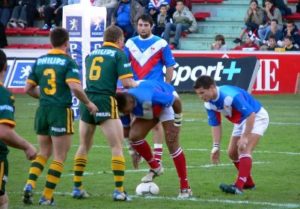Socrates is sitting on the steps at the local gym when he notices one of the Australian National Rugby League’s (NRL) most famous veteran coaches approaching the front door. The coach sees the old hooker/philosopher and realizes that it’s too late to turn around and run off… but he isn’t in the mood to be harassed by the busybody sports thinker today. Socrates doesn’t miss a beat. He jumps to his feet and purposefully strolls up to the coach who nervously flicks his fringe of greying blond hair to one side.
Socrates: Hoi… coach! Great to see you. What’s up?
Coach: Hey Socrates. Nuthins’ up. Just got time for a quick workout before the lads arrive for practice. No time for chatting today.
Socrates: Coach. A quick question before you work on your abs. I’ve noticed that you sometimes get a bit upset when your players are penalized by referees more often than your opponents. Is that fair to say?

Coach: Oh geez! Well, not if I think my boys are guilty of poor disciple. If they have been penalized fairly I get pissed off with them – not with the ref! But it’s true that I teach my blokes good disciple… and it twists my nuts when I see opposition players getting away with murder while my guys are getting hammered by the ref.
Socrates: So you think that some teams cheat and manage to get away with it?
Coach: Yeah. Sometimes I think that that’s true. For sure!
Socrates: How would you define the word “cheat”, coach?”
Coach: Well, that’s obvious! When someone breaks the rules, of course.
Socrates: Really? Don’t people break the rules all the time?
Coach: Well, I guess that’s true to some degree. Players accidently getting off-side… or accidently blocking a defender… or doing something technically illegal in a play the ball or a scrum.
Socrates: Should such rule breaches always be penalized then?
Coach: Of course not. It’s not cheating if you break the rules but don’t get any advantage out of it.
Socrates: Well then… would that change your definition of “cheating”?
Coach: Maybe you are right. Maybe cheating is where you get an unfair advantage over your opponent.
Socrates: So you think that sometimes your team’s opponents are given an unfair advantage?
Coach: Not always. But it happens. And it boils my bollocks! Some teams seem to pull it off more than others, too.

Socrates: Without getting personal give me an example. What is one situation where some other teams are given an unfair advantage?
Coach: That’s easy. Some teams kick into the corners then have at least two kick chasers hit the kick returner. The chasers then hold the bloke with the ball up while a third defender grabs his legs (picks him up by his legs) then they carry him back… sometimes five meters. Bloody commentators call it great defence. They call it pinning a team to their goal line. I call it bollocks. Usually the bloke has surrendered at the first hit. He’s tackled. The ref should call “held” and let the bloke play the ball. But often the ref doesn’t say a thing until the runner has lost five meters. Then the poor bugger has to play the ball almost on their goal line. The same team will try the same thing on the second and third tackles too if the ref will let them. It’s blatant cheating and the ref lets them get away with it.
Socrates: I can see how you would think that this qualifies as cheating under your current definition. But would you still think it cheating if the referee allowed your team to do it too?
Coach: Hmmm. I might have to think about that.
Socrates: I used to play hooker for the Athens Rugby Union team a couple of thousand years ago. Now I know that Rugby and Rugby League are a bit different but let me give you an example from Rugby that might make some sense. That was way back in the days when hookers, in rugby scrums, used to strike for the ball and scrum halves had to put the ball pretty much into the middle of the scrum rather than feed it straight into the second row. The rules said that I could not strike for the ball until the ball landed in the scrum. Knowing that I would have a delayed reaction time, I used to strike for the ball when I saw the scrum half release the ball when feeding it into the scrum. Do you think that I was cheating?
Coach: Not if your foot didn’t move until the ball landed in the scrum.
Socrates: Sometimes my foot probably moved a fraction before the ball bounced in the scrum. Sometimes the ref would be fine with that. The ref isn’t holding a slow-motion movement detection device that peeks inside a scrum. So they have to make a “line-ball” call. But sometimes I would get penalized. What do you think of that?

Coach: Different referees interpret the rules slightly differently… or see things slightly differently I suppose.
Socrates: I guess so. So much so that I used to make it my business, early in every game, to work out just how early a referee would allow me to strike for the ball. That usually meant that I would give away a penalty early on but once I had an idea of how the ref interpreted the rules I was cool after that. Is that cheating? Was I a cheat? Would you call me a cheat?
Coach: I’m not sure. Maybe. But you’re not really trying to get an unfair advantage. You’re just trying to play the game by the way the ref sees the rules. To not do this is to give your opponent an unfair advantage.
Socrates: Actually, I don’t give a damned if you wanna call me a cheat. I’ve been called worse. I’m much more interested in what you think about rules. Are “the rules” always black and white?
Coach: I guess not. I suppose that sometimes there is a fine line between what is legal and what is not legal.
Socrates: So would it be cheating if your opponents… and your team’s players, as well… got away with that trick of carrying the kick returner back to their goal line?
Coach: I guess not.
Socrates: So… you believe that so long as both teams are allowed to use a particular tactic that some might consider not strictly within the rules of the game then that is okay?
Coach: Well… I suppose you have convinced me of that. Yes.
Socrates: So how does all this impact upon your role as a coach?
Coach: What has coaching got to do with it?
Socrates: Well, let me put that another way. Those teams that use the “carry the kick returner backwards” ploy. Do you think that they came up with this themselves or was it something they were taught?
Coach: I see where you are coming from. You are saying that it is a coach’s job to teach players how to cheat.
Socrates: Am I? I thought we decided that if a referee allows both teams to use a tactic that might push the edge of “the rules” envelope then there is no unfair advantage and that it is not cheating. Am I wrong?

Coach: Okay. You’re saying that if a coach doesn’t teach his or her players to play the game to the ref’s interpretation of the rules then it is the coach who is responsible for his team having an unfair disadvantage.
Socrates: You said it. But I wouldn’t disagree with that.
Coach: But what if a referee’s personal interpretation of the rules was ruining the game… or the referee was allowing one team to do stuff that they wouldn’t let the other team do?
Socrates: Well, that seems to be a completely different matter. What would you say about that?
Coach: Well the administrators of the sport would have to take a fresh look at the rules…. or look at how the refs were being coached… or at the performance of the refs themselves.
Socrates: That seems fair enough to me. Here is another quick question. There are several teams in your NRL competition where many coaches, players, and fans complain that they are constantly “off-side” but still get away with it. What do you think of that?
Coach: Yeah. I’ve harboured a suspicion for a while that some of the more “blessed” teams seem to have more leeway from the refs when they charge up in defence after the play the ball.
Socrates: Really? Explain what constitutes “off-side” in such situations. What do the rules say?
Coach: The rules say that the line of defenders cannot start moving up until the ball has been played and it clears the ruck (the play the ball). If one or more defenders charge up in defence before the ball has cleared the ruck then they have committee a ruck infringement.
Socrates: “Cleared the ruck?” What does “cleared the ruck mean?”
Coach: The tackled player must roll the ball back to the dummy half who is standing behind him using his foot to roll the ball.
Socrates: So is the ball clear of the ruck when the tackled player’s foot is no longer touching the ball… or when the ball emerges from under his feet… or when the ball is fully away from his feet? Surely these questions are significant in that the answer constitutes the moment when the defensive line can launch.

Coach: Yes. That’s right. And, no! I don’t know the answer. I guess there is no certainty about precisely when the ball clears the ruck. But usually the refs advise the defensive team to “hold” until they think the ball has cleared the ruck and then signal that they are free to move by saying “clear”. So… the refs usually give the players a fairly good idea of what they are thinking. But still, there is no certainty here either. One has to account for the delay of a ref making the call. If a defensive line move fractionally before the ref’s call maybe the ref will be okay with that.
Socrates: Ah! No certainty! Well said. So is it possible that “no certainty” is the crux of the matter? In sport… or in life, in general, it is rarely helpful to expect or hope for certainty, because, as you suggested, it doesn’t exist. Hoping for black and white answers and rulings will lead to disappointment. Actually, I got kneed in the bollocks in a basketball game during a jump ball once. The bastard didn’t even jump. Just stuck his knee out. That was pretty black and white. He got ejected on the spot. But back to the teams that seem to be “off-side” all the time and get away with it. What’s going on there? Are they really “off-side”?
Coach: Well, it’s similar to the way you used to strike for the ball in rugby union scrums. You would push the edge of the envelope to figure out what the ref thought was a fair strike for the ball. But geez, Socrates. Rugby League is a simple game. Simple rules. We’re simple folks. Don’t you think you are overthinking it?
Socrates: Wasn’t it you who said that some teams are getting away with being offside. You also said some teams are allowed to carry their attacking opponents back to the goal line despite the player being tackled. Don’t these issues warrant some thought? Isn’t it a bit too simple to blame the referees? I’m not suggesting that we should try to make the game more complex. Let’s keep it simple, for sure. Even a sports philosopher believes in simplicity. But since uncertainty is the only certainty you can expect with referees (and rules) surely you and your team should prepare for that? Besides… what could be simpler and more straight forward than attempting to be the team that has the fastest straight line in defence? How important is it for a team to have a quick defensive line?
Coach: It couldn’t be more important. It’s a huge advantage. We do a lot of defensive practice and we even practice speed in the defensive line, but we don’t really practice the timing of the defensive line taking off. Perhaps some teams are coached to have their straight line of defence rush forward slightly before the ball clears the ruck just to see how the ref will react. If they keep a nice straight line it kinda makes them look less like they are off-side, I suppose.
Socrates: So… again… it’s more of a coaching matter than a refereeing matter. Teams need to be coached to deal with uncertainty. Teams need to be ready to react to different ways that the referee might interpret the rules. Teams need to practice to take advantage of any leeway that the referee might give them. As you suggested, it’s not a matter of cheating or getting an unfair advantage.
Coach: This is a huge issue. Earlier in the season we lost a game where the opposition gave away two penalties in eighty minutes of football… and my blokes gave away twelve… even with me ranting to them about discipline. And guess what. The bastards on the other team scored nearly every one of their tries on the back of one of our penalties. We scored a similar number of tries but had to do it without any ref assistance.

Socrates: So… what do you think that that means?
Coach: Well, I guess its not so much a matter of harping on at my players about following the rules because, maybe, while “the rules” might seem black and white, their interpretation can be subjective. I need to coach my players to deal with shades of grey – with uncertainty. The leaders in the squad need to know what the refs expect of them and the team and to give the refs what they want… even if they think the ref is wrong. And we need to practice hard at those areas of uncertainty. If we keep doing things that we think are okay, but the ref doesn’t like, we will keep losing games. Our fault!
Socrates: That makes sense to me.
Coach: Okay. Now can I ask a question?
Socrates: Of course. Sure. Go right ahead.
Coach: Has anybody ever told you that you are annoying… with all those questions? Oh… and can I go in the gym now?
Leave a Reply